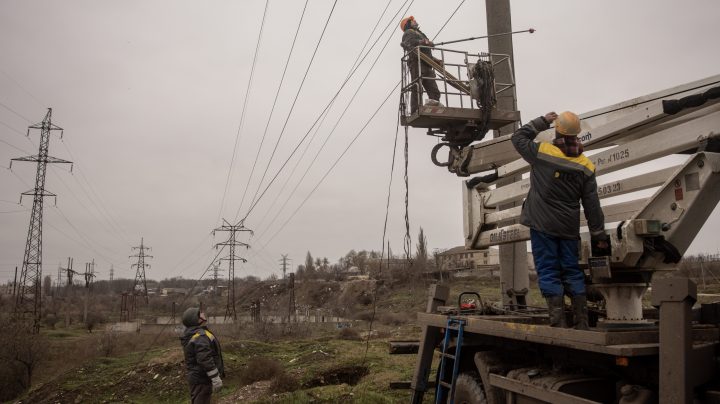
Russia tries to pull the plug on Ukraine’s electricity

Since October, Russia has been aiming many of its missiles at Ukraine’s electricity infrastructure. The attacks appear to be intended to further damage the Ukrainian economy and inflict misery on civilians. In that, they are succeeding.
One day last week, according to President Volodymyr Zelenskyy, almost 6 million Ukrainians woke up to find they had no power, and many of them have been suffering water shortages too.
Targeting power, in particular, threatens catastrophe for a population that has already suffered wide-scale death and destruction since the Russians launched their invasion a little more than nine months ago.
“Every element of Ukrainian society that requires electricity is going to be pressured, from hospitals to homes. And it will have grave humanitarian impacts if it’s to continue,” said Joseph Majkut, director of the Energy Security and Climate Change program at the Center for Strategic and International Studies in Washington, D.C.
So far, the attacks have knocked out some 40% of the country’s electricity supply, according to DTEK, Ukraine’s largest private-sector power company. This has led to daily blackouts that last between four and eight hours in different parts of Ukraine.
The Russian leader has been lashing out in impotent fury, said Tonya Antosha, DTEK’s chief spokesperson, in the capital, Kyiv.
“This is happening because Russian President Vladimir Putin is being defeated on the battlefield, so he’s terrorizing the civilian population,” she said.
But there could be a method to this evil madness, said Andrian Prokip, an energy expert with the Ukrainian Institute of the Future, a Kyiv-based thinktank.
“The key aim is to conduct psychological pressure on the Ukrainian people so that they pressure the government, pushing the government for negotiation,” Prokip said. Such a negotiation can have only one outcome, according to the Kremlin: Ukraine accepts the annexation of the territory that Russia has occupied.
If the aim of the power network attacks is to force Ukraine to the negotiating table, it will fail, said DTEK’s Tonya Antosha. Although they are suffering, the Ukrainian people are buckling down and adapting to an erratic power supply.
“They’re buying generators, they’re buying candles, they’re buying warm clothes. They’re ready to survive this winter, no matter what it takes,” she said. “We civilians have all become soldiers in this second front — the energy front.”

But in attacking the country’s power, Putin may have had an additional, secondary target: the European Union. Ukraine plugged into the EU’s grid just after the invasion and had been pumping electricity into the bloc since the summer.
“European Union states had this relatively cheap electricity from Ukraine rather than producing it from some gas at extraordinarily high prices,” Andrian Prokip pointed out.
Three EU member states — Poland, Romania and Slovakia, as well as Moldova — had been receiving Ukrainian electricity, and there was talk about Germany taking some too. With its economy in a post-invasion slump, Ukraine had an even bigger surplus of electricity than usual. And there was enough to help the Continent wean itself off Russian natural gas, said Tonya Antosha.
“Ukraine is basically the only country that can help Europe get rid of its overdependence on Russian energy resources,” she said.
However, for the time being, it cannot help Europe anymore, thanks to Putin’s attack on Ukraine’s power network. And that’s a setback for the EU. The loss of Ukrainian electricity could intensify the bloc’s energy crunch and increase support within the EU for appeasing Putin and pressing the Ukrainians to cave to his demands.
But Joseph Majkut of the CSIS pointed out that the opposite is happening: The war has focused European minds on the importance of keeping Ukraine’s power networks out of Russian control.
“Transformers are being shipped to Ukraine from European countries. Development banks are thinking through how they can finance the reconstruction of the Ukrainian power sector,” he said.
Around three-quarters of Ukraine’s usually abundant electricity is carbon-free, coming from nuclear and renewable sources. It’s long been Ukraine’s ambition to become a giant green-energy hub for the EU. Ironically, Majkut said, achieving that dream has been given fresh impetus by the invasion.
“The dynamic that Putin has really walked himself into is the acceleration of the economic and technical integration of Europe and Ukraine,” he said.
After the war, and partly due to those attacks on its power supply, Ukraine may wind up more firmly plugged into the West than ever.
There’s a lot happening in the world. Through it all, Marketplace is here for you.
You rely on Marketplace to break down the world’s events and tell you how it affects you in a fact-based, approachable way. We rely on your financial support to keep making that possible.
Your donation today powers the independent journalism that you rely on. For just $5/month, you can help sustain Marketplace so we can keep reporting on the things that matter to you.

















